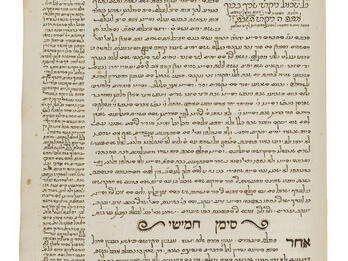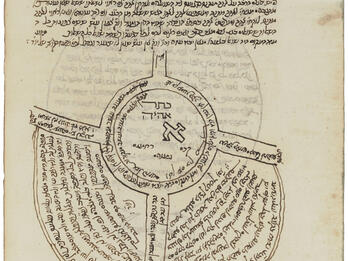Regulations of a Pietistic Confraternity in Safed
These are the words that the divine man Moses, R. Moses Cordovero, may his memory be for a blessing for life in the world-to-come, spoke concerning that which man should do and live by, and there are thirty-six things.
1. He should not turn his heart away from pondering matters of Torah and matters of sanctity; this is so that his heart will not be empty and void of ruminations on the Torah and on the commandments, in order that his heart may be a dwelling place for the divine presence.
2. He should not get angry at all, as anger leads man to several transgressions. Go and learn this principle a fortiori from Moses, may peace be upon him [see Leviticus Rabbah, to Leviticus 10:16]; and you have known from our rabbis in the Zohar, may their memory be for a blessing, about the defect of anger from the verses: Cease from man, in whose nostrils is a breath [of anger] (Isaiah 2:22) and: He tears himself in his anger (Job 18:4). And even if some rise up against him, he should be of those who accept offense.
3. He should always have a pleasant disposition toward people [see b. Ketubbot 17a] and treat them gently, even those who transgress the Torah.
4. He should not drink wine at all during the day, but only at night, and it should be diluted. Only on Sabbaths, festival days, and Rosh ḥodesh may he drink during the day.
5. He should be sparing with meat and wine on regular weekdays, even at night, because eating these foods gives strength to Samael [a demonic figure].
6. He should not ponder worthless matters during the time of prayer; rather, he should contemplate matters of Torah, the performance of commandments, and matters of sanctity.
7. He should not say anything derogatory about any man, nor even any creature or animal.
8. He should not curse any man from the people of Israel, even when he is angry, but rather he should bless him, and through this he will be blessed, according to the verse: And I will bless those who bless you (Genesis 12:3).
9. He should speak only words of Torah when in the synagogue.
10. He should not speak about matters of the world at all, but only about matters of Torah.
11. His hand should not touch his body, and he should not lower his hand below his navel.
12. He should not make any vow, whether light or serious, even if it is truthful.
13. He should not tell lies, and he should distance himself from those who lie, and no lie should come out of his mouth in any manner.
14. He should study matters of service [of God] with one of the members of the community every day.
15. Every Friday afternoon, he should review with that member of the community that which he did on every day of the week, and then he will be in a fit state to welcome the Sabbath Bride.
16. He should have as much intention in his prayer as he possibly can; he must at least concentrate hard during the first three benedictions, the four points of bending the knees and the four points of straightening up. For regarding one who does not have proper intention at these points, the divine presence shouts at him: “The Lord has delivered me into the hands of those against whom I am not able to rise up!” (Lamentations 1:14).
17. He should take care to pray the silent and reader’s repetition of the Minḥah Amidah with a tallit and tefillin.
18. He should recite Grace after Meals out loud so that his children will say it after him, letter-for-letter and word-for-word.
19. He should take care on Sunday not to eat meat or stew made with meat, and not to drink wine, and he should refrain from merriment in wine on this day more than on any other, with the exception of holidays, Rosh ḥodesh, and a feast for the performance of a commandment.
20. Every night he should sit on the ground and he should lament over the destruction of the Temple, and he should also have the intent to cry over his sins, which lengthen the final coming of the Messiah.
21. He should not arrange public feasts in his house other than those involving the performance of a commandment.
22. On every weekday, before Grace after Meals, he should say Psalm [137]: “By the Waters.”
23. He should be careful to refrain from idle conversation as much as he possibly can, and this is listed as one of the ten pious practices ascribed to Rav, that he did not carry on an idle conversation at all during his lifetime [see Maimonides, Sefer Madda, Hilkhot De’ot 2:4].
24. He should take care not to be part of the four groups that will not greet the divine presence: the flatterers, liars, jesters, and slanderers [see b. Sotah 42a].
25. He should give charity every day, in order to atone for his sins, as it is said: Your sins shall be broken off by charity (Daniel 4:24).
26. He should have intense focus during the recital of the Shema‘, in order to purify his thoughts so that he will take the words to heart.
27. He should listen properly to the reading of the Torah by the prayer leader, and he should not disturb him in any manner.
28. He should take care to fulfill his vows immediately, and he should not tarry in fulfilling them beyond thirty days.
29. He should take care to confess before eating and before sleeping.
30. He should not recite the Sheheḥiyanu blessing in the three weeks between the fasts of the seventeenth of Tammuz and Tisha be-Av, and he should not eat meat or drink wine, except for one who has been fasting, as he is permitted due to the fast.
31. He should fast, in accordance with his strength.
32. He should ponder the words of Torah every single time he chews, in order that the food should become like a sacrifice and that the drinking of water and wine should be like libations.
33. He should busy himself every day with the Bible, Mishnah, Talmud, kabbalah, and Jewish legal matters.
34. He should learn the entire Talmud three times over a period of twelve months.
35. He should shed tears during all of the prayers, or at least during one of them.
36. He should fast on three consecutive days, four times a year, at four different periods; and if he adds to this, he is praiseworthy.
[He should always speak with members of the community in the holy tongue.]
[At the table, before the blessing over the meal, he should say two chapters and one psalm.]
[On every Sabbath eve he should learn Mishnah, as best he can.]
[Every week, he should review all of the Mishnah that he knows.]
[Every week, he should learn at least two chapters of the Mishnah by heart.]
Notes
The words in brackets appear in the original Hebrew facsimile.
Credits
Published in: The Posen Library of Jewish Culture and Civilization, vol. 5.





